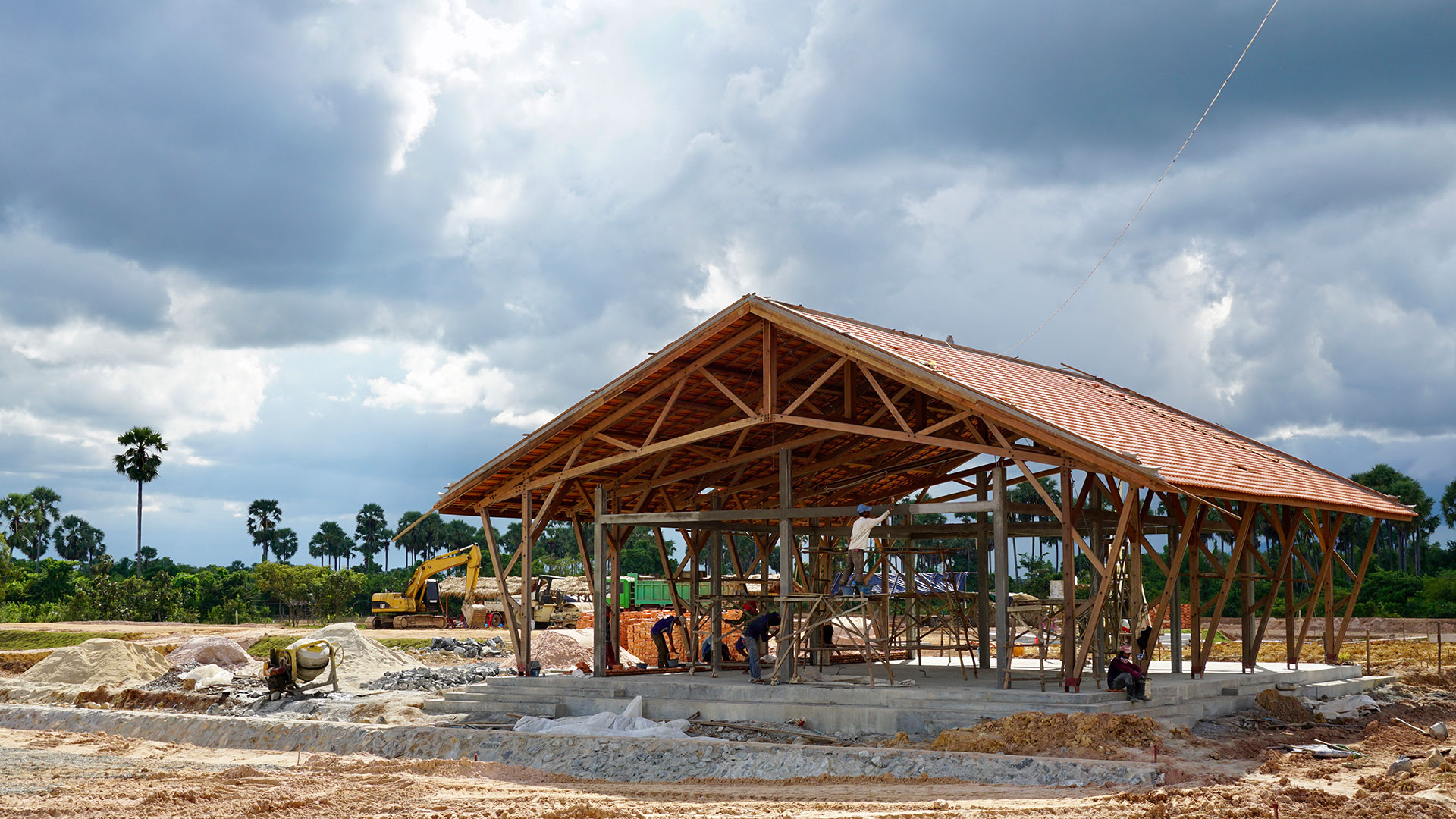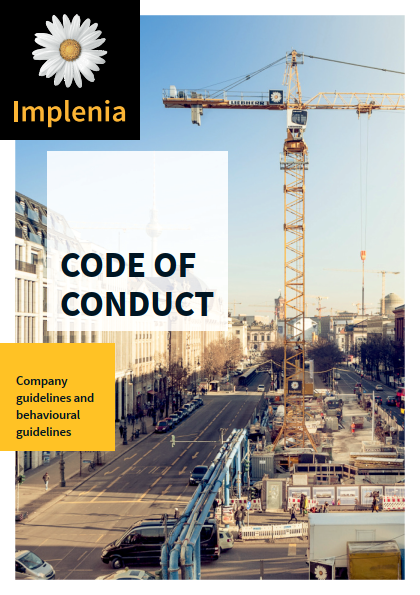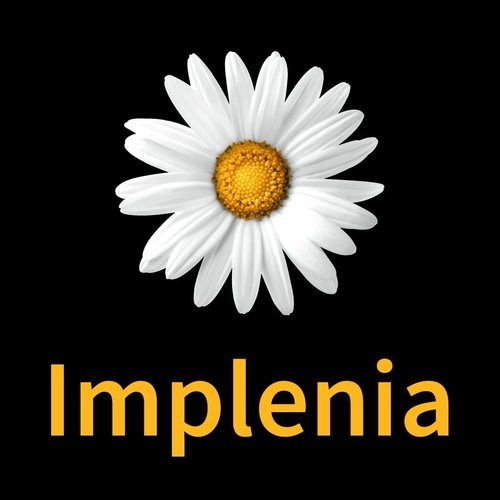


Social commitment and compliance
Content

Code of Conduct
GRI 102-16
Implenia has set out its underlying values as a responsible corporation in its Code of Conduct. These values are: excellence, collaboration, agility, integrity and sustainability. The Code governs the way employees behave towards each other and towards business partners, authorities and the environment.
The Code of Conduct forms an integral component of Implenia’s employment contracts and is binding on all staff. All new employees complete a e-learning course or face-to-face training on it, and even long-standing employees receive regular internal training on the contents Code.
GRI 102-17
Each national organisation has appointed a Country Compliance Officer who acts as the first point of call for queries about compliance issues. Employees can also go to the compliance officer if they suspect or actually witness malpractice. They can, of course, also report directly and anonymously to the Compliance Department. The company guarantees that whistle-blowers will be protected and that each case will be investigated comprehensively and neutrally (see below).
In mid-2020, Implenia amended its compliance organisation to cope with the additional issue of data protection. Country Heads Legal now also function as each national organisation’s Compliance and Data Protection Officers. The exception is Germany, where data protection is handled by the responsible Data Protection Officer. Country Heads Legal are supported by local HR and Finance representatives to ensure that employees’ concerns and needs are addressed more effectively. German Grüninger is the Chief Compliance Officer, and he represents this area of responsibility on the Implenia Executive Committee.
Human rights
GRI 102-12
Implenia strictly follows the United Nations Universal Declaration of Human Rights and the European Convention on Human Rights (ECHR) in all its business activities. The company recognises these in full and places them at the heart of its own governance structures and guidelines.
The following human rights topics are particularly relevant to the construction industry and to Implenia as a major employer:
- Art. 3: Gender equality
- Art. 6/7: The right to work and adequate remuneration
- Art. 8: Right to establishment of unions
- Art. 9: The right to social security
- Art. 10: Protection of families, pregnant women, mothers and children
- Art. 11: Right to an adequate standard of living, including adequate food, clothing and housing
- Art. 12: Right to the highest attainable standard of physical and mental health
In the European home markets, human rights form the basis of national legislation, which means, of course, that they are a core part of Implenia’s operational standards and procedures.
However, before reaching the country where they are finally used, many building materials and products go through global manufacturing processes and supply chains. Implenia makes considerable efforts when buying materials to ensure they are not the product of human rights violations such as child labour, life and health-threatening working conditions, or gross environmental malpractice.
In 2014 Implenia built up a supplier management system designed to ensure transparency and to identify any violations of human rights. Direct suppliers in particular are subjected to regular assessment. And with master agreement partners, Implenia goes yet another step further by asking them to require the same social and environmental quality standards of their own subcontractors.
The longer the supply chains are, the more difficult it is for a company to verify that human rights are being respected. Consequently, Implenia wants to do more to help shape industry standards so that there can be a general increase in the transparency of supply chains for construction materials.
Fighting corruption
Competition within the construction sector is fierce, but Implenia always competes fairly and has a zero-tolerance policy towards anti-competitive behaviour. The company adheres strictly to all national and international antitrust and competition regulations, and it refuses to tolerate any form of bribery or corruption.
Implenia checks each project to ensure that internal and external requirements for fair competition are met. Additionally, the dual control principle is applied in order to prevent corruption. Auditors also regularly check the books for anything suspicious as part of the regular audit process.
Implenia has formulated Group-wide competition regulations to help familiarise employees with competition law and protect them from infringements. The instructions are unequivocal. All forms of agreement that could infringe competition law are banned, for example, and the rules make it very clear to employees what behaviour is expected of them.
Additional Group integrity guidelines flesh out the principles of the Code of Conduct as they apply to corruption and bribery. They contain binding obligations for the prevention and active fight against corrupt practices and attempts at bribery. Implenia expects its employees to adhere strictly to these laws and guidelines.
The integrity guidelines include concrete rules on accepting and offering personal gifts, for example. They set out country-specific financial thresholds, above which personal gifts either have to be approved or are forbidden.
Implenia doesn’t just discuss compliance issues with its employees when they first join the company. Workers are invited to compliance training sessions regularly throughout their career at the company. In this way, Implenia ensures that its people have a deeper awareness and understanding of the topic.
To raise awareness among employees, Implenia also uses its regular communications to address important matters, including the latest industry developments. “Impact”, the staff magazine also regularly features realistic everyday situations to highlight where permissible business practices end and illegal behaviour, such as bribery or corruption, begins. Finally, pocket cards on specific topics – rules for meetings for example – are distributed to staff.
Infringement of competition law
GRI 205-3
If Implenia is implicated in investigations or lawsuits relating to competition law, the company cooperates with the authorities and provides transparent information about the matter concerned. The following incidents have occurred in recent years:
In 2013, the Swiss Competition Commission opened an investigation against eight road-building and civil engineering companies in the districts of See-Gaster (SG) and Höfe (SZ). Implenia, or more precisely the former Batigroup AG, was one of these companies. The case, which centred on agreements made when public and private road-building and civil engineering contracts were awarded in the years between 2002 to 2009, was closed in 2016. Implenia cooperated fully with the Competition Commission and helped with investigations into other agreements on price and geographical areas. As a result of this cooperation, no sanctions were imposed by the authorities.
Between 2010 and 2016, the Competition Commission conducted an investigation in Canton Grisons, which looked into possible illegal anti-competitive agreements in the market for road construction, building construction and civil engineering prior to 2010. At the end of 2017, the Competition Commission closed six individual investigations into bid-rigging in the Engadin. Implenia was involved in the case of two calls for tender by private clients. The Competition Commission finished its final investigation in August 2019. Throughout the entire process, Implenia Schweiz AG cooperated fully with the Competition Commission and helped with investigations into other agreements on price and geographical areas. As a result, no fines were imposed.
In 2016, the Austrian Federal Competition Authority fined several companies for price-fixing in the drywall building market. Tüchler Ausbau GmbH, then a subsidiary of Implenia, was one of the companies involved. Implenia acted immediately and parted company with the responsible manager.
In 2017, Vienna’s public prosecutor for economic and corruption offences opened an investigation against Implenia Baugesellschaft GmbH into suspected bid-rigging. The investigation is still underway. The matters under investigation go back to the years between 2008 and 2012, i.e. prior to Implenia’s takeover of the former Bilfinger in 2014.
Working with universities
In order to strengthen knowledge transfer between academia and business, and further the development of skilled professionals, Implenia has for some years now been working more closely with universities. In Switzerland, for example, Implenia supports the ETH Zurich’s “Excellence Scholarship & Opportunity Programme” with an annual contribution. Since the start of 2016, Implenia, as industrial partner, has supported the Assistant Professorship for Innovative and Industrialised Construction under the leadership of Prof. Daniel Hall. The aim is to develop new expertise in civil engineering and construction, and this close partnership is characterised by mutual transfer of theoretical and practical knowledge, joint projects and shared work, as well as constant interdisciplinary discussion.
Implenia also maintains close relations with the EPFL in Lausanne. Every year, Implenia offers the students at the University of Architecture, Civil Engineering and Environmental Sciences (ENAC) several semester topics in the form of design projects. It also works with ENAC’s laboratories on research and development topics and takes on trainees at the end of their first degrees (bachelor or master).
The President of the EPFL and Implenia’s top managers have met regularly since 2019 to define a strategy for closer institutional ties between the two organisations. The aim is to identify specific requirements and to make the most of the two partners’ specific strengths. In November 2020 Implenia and the EPFL jointly organised a “hackathon” (LauzHack) that brought 300 students together to develop new digital answers to the question “how do we save lives on construction sites?”.
In Germany, Implenia has continuously expanded its network of partner universities since 2016 and is currently working closely with eight institutions. It is, for example, supporting research projects at the Technical University of Darmstadt, supporting degree theses at RWTH Aachen University, giving lectures at the University of Applied Science Biberach and awarding scholarships at the Technical University of Dortmund.
Implenia is proud of its wide university network and its longstanding commitment to teaching and research, which has consistently delivered results in the form of knowledge sharing, joint initiatives and projects, informative master’s theses and graduate employment.
Social commitment and sponsorship
Implenia’s leading position as a construction and real estate services provider in Switzerland brings a responsibility to make a positive contribution to society. The company’s commitments in this regard go beyond the real estate and construction industry and focus on culture, innovation and education, as well as on social institutions. Sustainability and partnership lie at the heart of all its commitments.
Implenia has, for example, worked for many years as a partner to “Smiling Gecko”, an aid project that runs economically and environmentally sustainable projects designed to improve the living conditions of people in rural Cambodia. Employees from all over Implenia go out to Cambodia for three month stints to support locals with their expertise and to help out with construction and infrastructure projects.
In the cultural sphere, Implenia has a partnership with the “YOUNG STAGE Circus Festival”, which aims to encourage the next generation of circus artists. Its mission is to offer talented young performers from all over the world a platform and a job exchange, to promote contemporary circus in general, facilitate networks and inspire children and young people. The “YOUNG STAGE Circus Festival” is the largest of its kind in Switzerland, and one of the most important in the world.
Implenia also helps to integrate disadvantaged people into the world of work. In Sweden, for example, the company entered into a partnership with the city of Stockholm in 2017 to find jobs for difficult-to-place people. These tend to be students, refugees or unemployed people who have previously found it hard to access the labour market. Implenia has so far been able to offer work to nine people.
The company adheres to high ethical standards when it sponsors or donates. Its own competition rules state that political organisations or individual politicians can only be supported if this is done transparently and within the bounds of statutory regulations. Payments to other organisations have to be open and cannot be intended to influence decisions.
Commitment to a green economy
The term “green economy” is shorthand for an economy that uses energy and raw materials prudently. There are many different green economy initiatives in many different countries, as well as at international level.
The construction industry is still far from being green, but to help it move faster in the right direction SINTEF in Norway has founded the “Green Construction Sector” network. SINTEF is one of the largest independent research organisations in Europe. Implenia joined the network in 2017 and takes part in its regular meetings. The network promotes close collaboration between members, and backs innovations that contribute to sustainable development.
Since January 2020, Implenia Sweden has been part of the national “Fossil Free Sweden” initiative and is collaborating on its roadmap for the building and civil engineering sector. The initiative and roadmap both aim for a climate-neutral value chain in building and civil engineering, with the long-term goal of producing no greenhouse gas emissions by 2045.
In Switzerland, Implenia works in major industry associations, such as “swisscleantech” and “öbu”, that lobby for a sustainable economic policy. As part of the CEO4Climate campaign, Implenia’s CEO André Wyss personally advocates for effective Swiss CO2 legislation. The draft bill approved by Switzerland’s parliament in autumn 2020 backs ambitious climate protection measures and a Swiss climate policy in line with the Paris Agreement.




